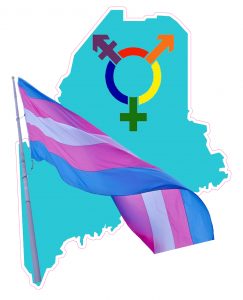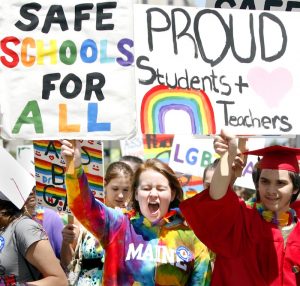This website will discuss efforts to protect and promote the rights of transgender students in Portland, Maine public schools.
Description of the Problem: Transgender Student Issues in Portland and Beyond
Introduction: Why Portland?

The Holocaust & Human Rights Center of ME
This fall, the Portland school board voted to pass a comprehensive, far-reaching policy that protects transgender and gender non-confirming youth in Portland public schools.
The new policy is the result of tireless organizing efforts by grassroots organizations, teachers, advocates, students, and parents. But the policy was not without pushback and has received harsh criticism on the local and national level. This will be explored in this website. Though a small city, Portland is at a watershed moment for transgender students in Maine and across the country, and thus is an ideal location to explore the issue of protecting transgender students in urban schools.
Defining Terms
Before this site dives in to a discussion about organizing for trans kids in Portland and beyond, it is necessary to establish some language and definitions that will be used throughout the site. “Transgender” is an identity category referring to those whose gender identity does not correspond with their sex assigned at birth. In this website, “transgender” and “trans” (a shortened word for transgender) will be used interchangeably. Trans people can identify within the binary categories of man and woman, or as various gender-expansive categories, including as bigender, nonbinary, genderqueer, and genderfluid, to name a few (Planned Parenthood, 2018). As of 2016, approximately 1.4 million Americans identify as transgender (Steinmetz, 2016).
Issues Impacting the Trans Community In School
In 2015, the National Center for Transgender Equality (NCTE) conducted the U.S. Transgender Survey, which sought to understand the experiences and social climate for transgender people. The survey revealed the widespread violence and harassment confronted by this marginalized group of people.

Portland Press Herald
Respondents to the survey noted the high rates of violence and mistreatment they face, and the survey demonstrated that kids in schools are far from immune to this violence. Most out trans respondents reported experiencing hate, harassment, and violence in K-12 school. Specifically, 54% reported being verbally harassed, 24% experienced a physical attack, and 13% were sexually assaulted in school because they were transgender (“Executive Summary”, 3).

Campbell Law Observer
Transgender students in public school systems often face insurmountable barriers to success in school due to discrimination and violence. Of those who responded to the NCTE survey, 17% left school due to the mistreatment they faced (“Executive Summary”, 3).
However, these barriers extend beyond just the harassment and violence noted above. Transgender students also experience barriers via school policies and practices that invisibilize, stigmatize, and erase their genders and their trans identities. Some of these barriers include the inability to use bathrooms and locker rooms that affirm one’s gender identity, being incorrectly gendered, or forced to be called by one’s given name. According to a 2002 study by psychologists Nuttbrock, Rosenblum, and Blumenstein, trans people’s mental health is significantly harmed when their gender identity is not affirmed (Nuttbrock et al., 2002).
In this way, for many trans kids school becomes a place that proliferates mental health struggles rather than promoting learning, growth, and safety. As such, schools across the country have begun to grapple with how to support transgender students while also appeasing parents, administrators, and stakeholders who hold a more conservative outlook with regards to gender.

Portlandschools.org
This debate just played out in Portland, Maine, which recently passed a comprehensive trans-inclusive policy for its public schools. It is an ideal city in which to explore the issue of supporting transgender students in urban public schools.
